book3 Module 5 Writing
沪教版上海牛津英语一年级上1A单元练习题.doc
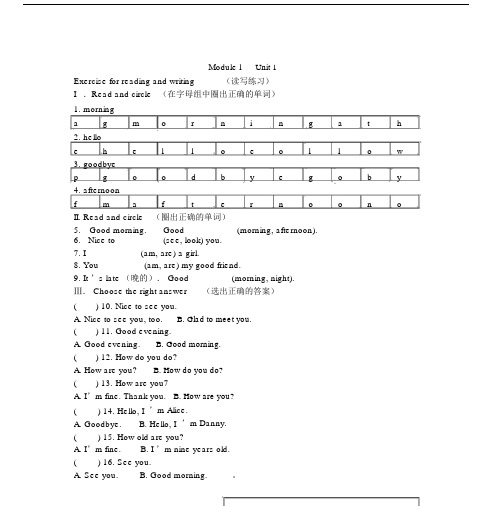
Module l Unit 1Exercise for reading and writing(读写练习)I.Read and circle (在字母组中圈出正确的单词)1. morninga g m o r n i n g a t h2. helloe h e l l o e o l l o w3. goodbyep g o o d b y e g o b y4. afternoonf m a f t e r n o o n o II. Read and circle (圈出正确的单词)5.---Good morning. -----Good___________(morning, afternoon).6.Nice to__________(see, look) you.7.I ___________(am, are) a girl.8.You_________ (am, are) my good friend.9.It ’s late (晚的). Good_________(morning, night).Ⅲ. Choose the right answer(选出正确的答案)( ) 10. Nice to see you.A. Nice to see you, too.B. Glad to meet you.( ) 11. Good evening.A. Good evening.B. Good morning.( ) 12. How do you do?A. How are you?B. How do you do?( ) 13. How are you7A. I’m fine. Thank you.B. How are you?( ) 14. Hello, I ’m Alice.A. Goodbye.B. Hello, I ’m Danny.( ) 15. How old are you?A. I’m fine.B. I ’m nine years old.( ) 16. See you.A. See you.B. Good morning. 。
Book 2 Unit 5 Music 大单元教学设计 人教版必修第二册单元整体教学设计
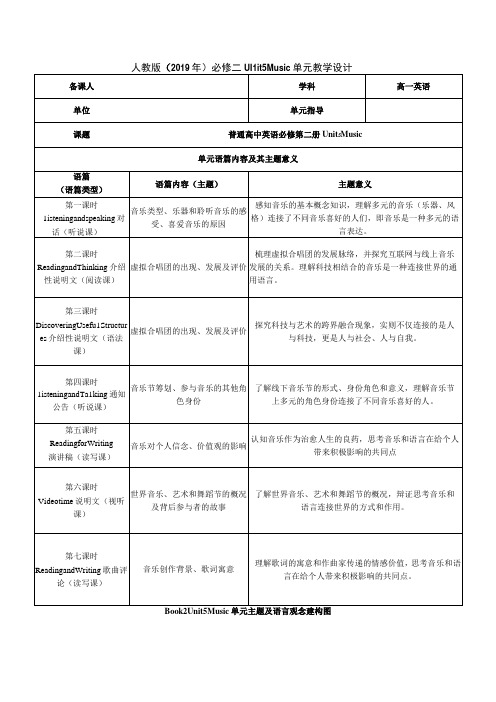
Book2UnitSMusic单元主■及遢直观念I1构就
单元目标
1.了解中外常见的不同类型的音乐特点和表现形式,在日常交际中得体恰当地表达关于音乐的偏好和喜爱。
2.阅读介绍虚拟合唱团及其创始人的说明性文本,理解和体会音乐在日常生活和社会发展过程中的积极作用。
并对
虚拟合唱团的评价,评价其价值和意义。
3.阅读和体会公众演讲文本所传递的信息和情感,分析和把握其语言特征和手修辞手法,写一篇关于音乐积极作用
的演讲短文。
通过本节课学习,学生能够:
1预测通知类听力文本内容,从而根据要求筛选获取重要信息。
2说出通知类听力文本的语言特点和结构特点。
3能够根据文中对话所呈现的这场音乐会通知的关键信息制作一份音乐会口头通知。
备课人李培睿学科高一英语
备课人李燕玲学科。
Writing (3)

3. Barcelona is the capital of Spain. ( )
4. The Church of the Sagrada Familia was built in 1926. ( )
Work in groups. Introduce Beijing to Tom. The useful tips:
1. the capital 2. the political and cultural center
3. be situated in the north of China
4. be visited by millons of tourists
8.A long time ago, Athens was the world’s most powerful city. ( )
4.post-reading
Paris, the capital and largest city of France, is ______ on the River Seine. There are many places of interest _________ (attract) more than 8 million tourists there every year. It is _______ for the Eiffel Tower, the _______ of Paris, and the Louvre, one of the world’s largest art galleries.
5. places of interest
6. the delicious food
Book3 Module 4 《英语周报》38同步评估答题卷
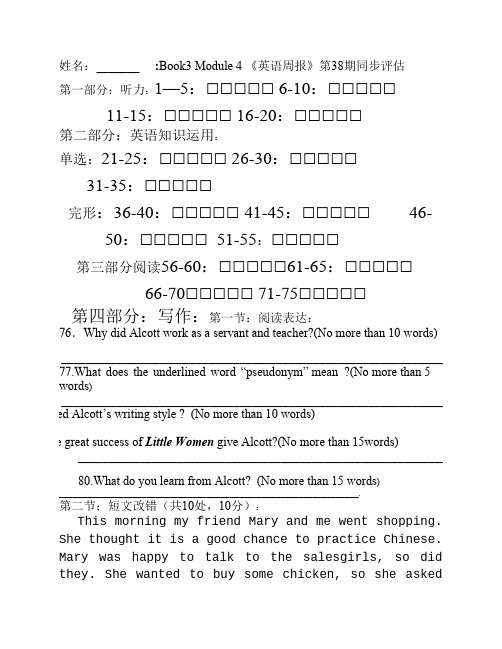
姓名:_______ :Book3 Module 4《英语周报》第38期同步评估□□□□□ 6-10:□□□□□第一部分:听力:1—5:11-15:□□□□□ 16-20:□□□□□第二部分:英语知识运用:单选:21-25:□□□□□ 26-30:□□□□□31-35:□□□□□完形:36-40:□□□□□ 41-45:□□□□□ 46-50:□□□□□ 51-55:□□□□□第三部分阅读56-60:□□□□□61-65:□□□□□66-70□□□□□ 71-75□□□□□第四部分:写作:第一节:阅读表达:76.Why did Alcott work as a servant and teacher?(No more than 10 words)_______________________________________________________________.77.What does the underlined word “pseudonym” mean ?(No more than 5words)___________________________________________________________________ What changed Alcott’s writing style ? (No more than 10 words)What did the great success of Little Women give Alcott?(No more than 15words)___________________________________________________________________.80.What do you learn from Alcott? (No more than 15 words)_____________________________________________________________________.第二节;短文改错(共10处,10分):This morning my friend Mary and me went shopping.She thought it is a good chance to practice Chinese.Mary was happy to talk to the salesgirls, so didthey. She wanted to buy some chicken, so she askedfor a salesgirl,” How much is the cock?” Gentle, thesalesgirl answered, ”I’m not sure whether it’s acock for a hen.” Mary became embarrassing andrealized she had made a mistake. All of us laughedinclude Mary. Then we went to buy some egg. I askedMary,” Do you want buy hens’ sons and daughters?”Mary shouted, “I can say eggs.” We laughed again.How an interesting shopping experience!第三节:书面表达(25分):(词数120左右;适当增加细节使行文连贯)某英文报社近期开展以保护环境为主题的征文活动。
[精]外研版(三起)小学英语六年级下册知识点归纳总结
![[精]外研版(三起)小学英语六年级下册知识点归纳总结](https://img.taocdn.com/s3/m/fbef7bbadc88d0d233d4b14e852458fb770b3863.png)
[精]外研版(三起)小学英语六年级下册知识点归纳总结外研版(三起)小学英语六年级下册知识点归纳总结Module 1一、词汇look看上去cashier收银员cola可乐dollar美元cent美分XXX享用,享受careful小心的Be careful!当心!二、句子1. I want to a hot dog, please.我想要一个热狗,谢谢。
2.—How much is it?它多少钱?—It’XXX.是十三美元二十五美分。
3. Enjoy your meal!好好享受你的美食吧!4. It looks good!它看上去不错!5. Can I help you?我能为你做点什么?6. Here you are.给你。
7.—What do you want to eat?你想要吃什么?—I want a hamburger.我想要一个汉堡包。
8.—What do you want to drink?你想要喝什么?—Milk, please.牛奶,感谢。
三、句型结构①询问你想要吃什么—What do you want to eat?—I want +食物. / I want to eat ...eg:—What do you want to eat?你想要吃什么?—I want to eat noodles and beef.我想吃面条和牛肉。
②询问你想要喝什么—What do you want to drink?—I want +其他. / I want to drink...eg:—What do you want to drink?你想要喝什么?—I want to drink juice.我想和果汁。
③询问价格How much is it? / How much are they?eg:—How much is this book?这本书多少钱?—It’XXX.十五元。
—How much are these shoes?这双鞋多少钱?—XXX.它们二十美圆。
高中英语:Book3 Unit4 Reading for Writing语言点

4.Firstly, exploring space has already ___m__a_d_e_a__d_i_ff_e_re_n_c_e__________
(发挥了重要作用)in the fight against world hunger.
It has directly resulted in the many satellites that now orbit Earth.
stop wasting time and money exloring space.
2.___S_o_m__e_p_e_o_p_l_e_a_r_g_u_e_t_h_a_t__________(一部分人认为) we should
stop wasting time and money exploring space.
1.浪费时间
1. a waste of time
2.世界各国
2. countries around the globe
3.各种各样的太空任务 3. various space missions
4.浪费时间做某事
4. waste time doing sth/on sth
5.尽快找到...
5. find immediate solutions to...
10.推动科技的进步 10. promote technological improvments
11.高端产品
11. high-end products
12.满足...的要求
12. meet the requirements for...
13.广泛的运用于 各行各业
14.日用产品 15.快速增长的人口 16.总而言之 17.长期的问题
新视野大学英语第三版读写教程Book3-Unit4-The Surprising purpo
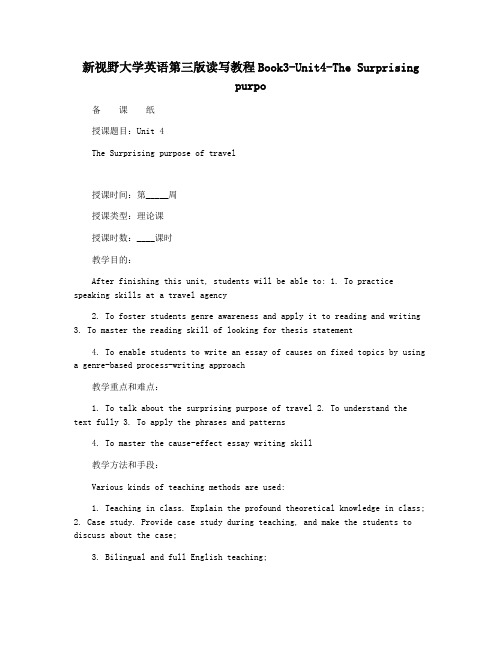
新视野大学英语第三版读写教程Book3-Unit4-The Surprisingpurpo备课纸授课题目:Unit 4The Surprising purpose of travel授课时间:第_____周授课类型:理论课授课时数:____课时教学目的:After finishing this unit, students will be able to: 1. To practice speaking skills at a travel agency2. To foster students genre awareness and apply it to reading and writing3. To master the reading skill of looking for thesis statement4. To enable students to write an essay of causes on fixed topics by usinga genre-based process-writing approach教学重点和难点:1. To talk about the surprising purpose of travel2. To understand thetext fully 3. To apply the phrases and patterns4. To master the cause-effect essay writing skill教学方法和手段:Various kinds of teaching methods are used:1. Teaching in class. Explain the profound theoretical knowledge in class;2. Case study. Provide case study during teaching, and make the students to discuss about the case;3. Bilingual and full English teaching;4. Learner-centered approach; situational & communicative method;5. Project-based approach1备课纸教学内容和过程:Section A The surprising purpose of travelStep One Warming-up Activities 30 minutes I. Write as many words related to travel as you can ? Varieties of travel ? Means of transportation ? Tourist attractions ? Entertainment activities ? Things to take ? Where to stay? Other words about travel II. Lead-in questions:1. Do you like travelling? What are the reasons for you to travel? ? To have a change? To experience something new and unfamiliar ? To see the world and understand different culture ? To marvel at the wonder of great nature ? To escape from a boring lifestyle ? To have a thorough relaxation ? To broaden one’s horizons2. What’s your suggestion to a student who wants to have a trip but doesn’t have enough money for it? ? Plan ahead? Find useful information ? Travel in group ? Go to a less-known place ? Pack necessary thingsIII Background knowledge1. Where is Left Bank café? What features does it have?? The Left Bank café is located in the village of Saranac Lake o n the Left Bank of the River Seine in Paris. It is a favorite meeting place of great artists, writers, and famous intellectuals since the early 20th century. LBC serves authentic French café-style food, including crêpes and tar tines, as well as2备课纸coffee, tea, wines and beers.2. What is Let’s Go? Give more information about it.? A world-renowned travel guide series, researched, written, edited, and run entirely by students at Harvard University.? It is claimed to be “the student travel guide” aimed at readers “both young and young at heart”.? Let’s Go was founded in 1960 and is headquartered in Cambridge, Massachusetts, the US. Office. 3. What do you know about Machu Picchu?? An ancient ruined South American city high up in the Andes Mountains in Peru.? It was built by the Incas, a Native American people of South America, in about 1500 AD,? It has a temple of the sun and many other buildings. ? It is a popular place for tourists to visit.Step Two Text Study 80 minutes I.Interactive reading of the text1) Why does the author choose the word “burdensome” to describe hisimaginary travel? (Para. 1)2) What does the author mean by “the rest of the journey can feel like a tediouslesson in the ills of modernity? It sucks.”? (Para. 2)3) Suppose travel is troublesome and sometimes even unpleasant, why do wetravel according to the author? (Para. 2-4) 4) What kind of travel is truly compulsory? (Para. 4)5) What is the irony when people travel to Paris trying to leave all thosetroubles behind? (Para. 5)6) What is the finding of the research? What does the author wants to prove byreferring to the example? (Para. 6)7) What do we need to do to trigger our creativity? (Para. 8)8) What are the secret cornerstones of creativity of travel?What will happen to usafter travel? (Para. 9)1. Reading comprehension3备课纸2. Structure of the text Part I Introduction (Paras. 1-4)The author gives us a vivid description of the imaginary travel experience, including how he struggles to get up in the early morning, how he gets to the flight gate after all trouble and how he finally gets stuck in the airport.The author puts forward a question: Why do we travel? Part II Body (Paras. 5-8)The author takes us to rethink the question: what is the real purpose of travel? Besides,she shares her own understanding of the real purpose of travel. Part III Concluding part (Para 9)We travel because we need to, because distance and difference are thesecret cornerstones of creativity..3. Summary of the TextTravel is ___________ and sometimes even unpleasant; then what is the driving force behind our travel? We travel because we need to. Sometimes our travel is a ____ because we should attend the business luncheon, because we should celebrate Thanksgiving with our mom. We travel because we want to.Owing to the fact that most travel is _______, we just travel followingour heart. Most people travel for the sake of __________, but their mind tends to solve the stubborn ___________ issues while on vacation. What is the real purpose of travel? Travelling to a new place can make us less controlled by familiar cognitive ________ that imprison us. As a result, we can better combine the new with the old, the mundane is ________ from a slightly more abstract perspective.To __________ travelers, multicultural contrast means that they are opento ambiguity and willing to see the world in different ways, thus to expandthe ______________ of their “cognitive inputs” as they refuse to__________their first answers and initial guesses. Of course, that mental flexibility is a side effect of difference and we know what we did not know in the past, by which we become more open-minded and less _______.Apart from its advantages, travel also has it _________, which make usnot take great pleasantness. More often than not, we need a _________ afterour vacation. We travel because we need to, because distance and differenceare the _____________of creativity. Travel will change our mind to some extent, which in4备课纸turn can have ________on everything in our life.II. Language Focus: Words and expressions1. Key words: 1) groan: (Para.1)vi. make a long low sound, e.g. because you are in pain or unhappy (因痛苦或烦恼等)呻吟,发出哼哼声 The old man was groaning with pain.v. speak about sth. in a way that shows you are unhappy 抱怨She sat down beside me and groaned about her working day. 她坐在我身旁,抱怨自己整日辛劳。
外研社小学英语三年级起点_重点句型、词组归纳
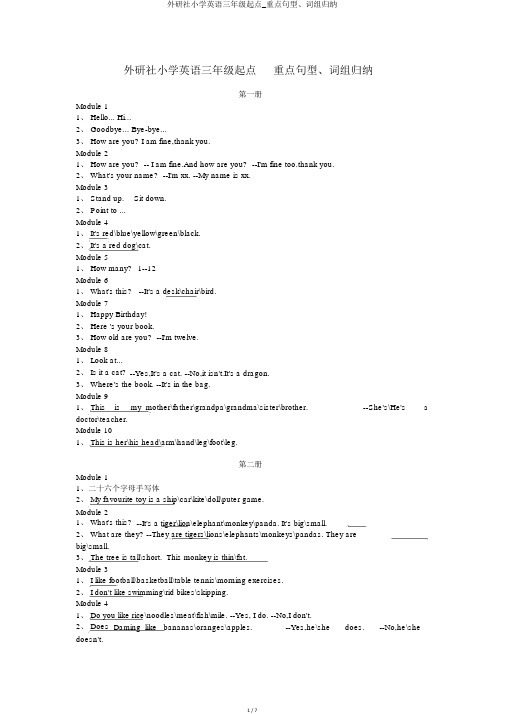
外研社小学英语三年级起点重点句型、词组归纳第一册Module 11、 Hello... Hi...2、 Goodbye... Bye-bye...3、 How are you? I am fine,thank you.Module 21、 How are you? -- I am fine.And how are you? --I'm fine too.thank you.2、 What's your name? --I'm xx. --My name is xx.Module 31、 Stand up. Sit down.2、 Point to ...Module 41、 It's red\blue\yellow\green\black.2、 It's a red dog\cat.Module 51、 How many? 1--12Module 61、 What's this? --It's a desk\chair\bird.Module 71、 Happy Birthday!2、 Here 's your book.3、 How old are you? --I'm twelve.Module 81、 Look at...2、 Is it a cat? --Yes,It's a cat. --No,it isn't.It's a dragon.3、 Where's the book. --It's in the bag.Module 91、 This is my mother\father\grandpa\grandma\sister\brother. --She's\He's a doctor\teacher.Module 101、 This is her\his head\arm\hand\leg\foot\leg.第二册Module 11、二十六个字母手写体2、 My favourite toy is a ship\car\kite\doll\puter game.Module 21、 What's this? --It's a tiger\lion\elephant\monkey\panda. It's big\small.2、 What are they? --They are tigers\lions\elephants\monkeys\pandas. They arebig\small.3、 The tree is tall\short. This monkey is thin\fat.Module 31、 I like football\basketball\table tennis\morning exercises.2、 I don't like swimming\rid bikes\skipping.Module 41、 Do you like rice\noodles\meat\fish\mile. --Yes, I do. --No,I don't.2、 Does Daming like bananas\oranges\apples. --Yes,he\she does. --No,he\she doesn't.Module 51、 I get up\go to school\have lunch\go home\watch TV\go to bed at ... o'clock.2、 What's the time? --It's half past five.3、 I have breakfast\dinner at ... o'clock.Module 61、 What do you at ...o'clock in the morning\afternoon? --I play football. Module 71、 At Spring Festival, we have a big family dinner.2、 We have Christmas in England.Module 81、 What do you do in spring\summer\autumn\winter.Module 91、 Have you got a pen? --Yes, I have. --No, I haven't.2、 He\She has got a bike. He\She goes to work by car.Module 101、 The panda is in\on\under the desk.2、 In spring\summer\autumn\winter.第三册Module 11、 Point to 13-20.2、 Have you got a tiger? --Yes,I have. --No,I haven't.Module 21、 Excuse me. Where's the...,please?2、 Turn right\left. Go straight.Next\up\down\near\at station.Module 31、 What are you doing?2、 She's \He's --writing a letter. --taking pictures. --talking to her friend.--playing with a toy train.3、 I'm listening to music. --watching TV. --reading a book!Module 41、 What are they doing?2、 They are doing taijiquan. --rowing a dragon boat. --drinking soybean milk. --playing basketball. --playing table tennis. --jumping. --running.Module 51、 Do you want some rice\noodles? --Yes,please. --No,thank you.2、 He's making noodles. ---fast food.3、 I'm making dumplings. --cooking vegetables. --making cakes.Module 61、 I can jump high. Can you? --jump far. --ride fast. --Yes, I can. --No, Ican't.2、 I'm the winner.3、 Can you make a cake? --play the flute. --wash clothes. --draw a dragon. Module 71、 We are going to get up at 6 o'clock.2、 We are going to go by plane.3、 I am going to visit my grandpa.Module 81、 What are you going to do for Sports Days?2、 I'm going to run --the 100 metres.--every day.3、 I'm going to do the-- high jump.--long jump.4、 Good luck!Module 91、 Can I have some soup\sweets\bread?2、 Sorry, you can't.--Yes, you can.Module 101、 How many birthdays are there in July --There are three.2、 1-12 个月份。
